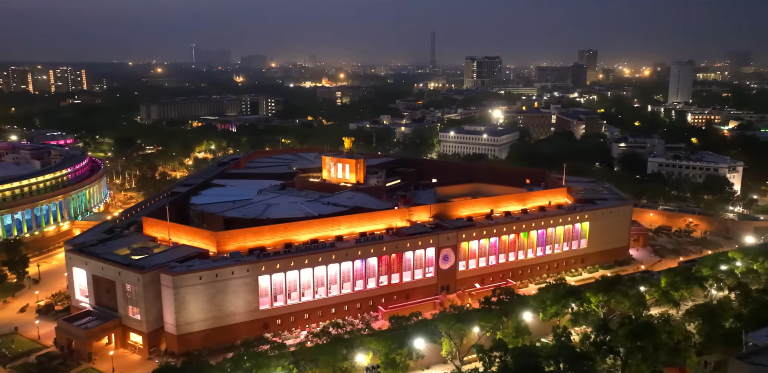Government Strengthens Efforts to Combat Drug Trafficking with New Initiatives
March 12, 2025
New Delhi: The Government of India in a reply in Rajya Sabha shared the details of a series of measures it has taken to combat the rising threat of drug trafficking. These steps include the establishment of enhanced coordination mechanisms, specialized task forces, and the expansion of the Narcotics Control Bureau (NCB) to address the growing challenge posed by illicit drugs.
New Coordination Mechanisms and Task Forces
To strengthen the coordination between central and state agencies, the government has set up a 4-tier Narco-Coordination Centre (NCORD). This will ensure better collaboration between Drug Law Enforcement Agencies (DLEAs) and other stakeholders working to curb drug trafficking and drug abuse. The government has also developed a unified NCORD portal that will provide critical information related to drug law enforcement.
In addition, dedicated Anti-Narcotics Task Forces (ANTFs) have been established in each state and Union Territory, led by senior police officers. These task forces will serve as the NCORD Secretariat for their respective regions and ensure the implementation of decisions made in NCORD meetings. To further improve coordination, a Joint Coordination Committee (JCC) has been formed under the Chairmanship of the Director General of the Narcotics Control Bureau (NCB) to monitor the investigation of significant drug seizures.
Empowering Border Forces and Expanding NCB’s Reach
The government has also taken steps to bolster the efforts of Border Guarding Forces, including the Border Security Force (BSF), Assam Rifles, and Sashastra Seema Bal, by empowering them under the Narcotic Drugs and Psychotropic Substances (NDPS) Act, 1985. These forces are now authorized to search, seize, and arrest individuals involved in illicit drug trafficking at international borders. Additionally, the Railway Protection Force (RPF) has been granted similar powers to combat drug trafficking along railway routes.
To enhance the effectiveness of the Narcotics Control Bureau, the government has increased its presence across India. The NCB’s Regional Offices have expanded from 3 to 7, with new offices in Amritsar, Guwahati, Chennai, and Ahmedabad. The NCB’s Zonal Offices have also grown from 13 to 30, including the addition of five new offices in Gorakhpur, Siliguri, Agartala, Itanagar, and Raipur. In total, the NCB’s workforce has been boosted with the creation of 536 new posts, bringing the total sanctioned strength to 1,496 officers.
Technology and Training to Combat Drug Trafficking
As part of its efforts to modernize its approach, the government has also set up a specialized task force focused on monitoring dark web platforms and cryptocurrency networks that facilitate narco-trafficking. The Multi-Agency Centre (MAC) will monitor these digital platforms and share intelligence across agencies, helping to capture emerging trends and tackle new methods of trafficking.
In terms of capacity building, the Narcotics Control Bureau has been actively involved in providing training to officers from various drug law enforcement agencies across the country. This is expected to enhance the overall capacity of India’s drug control framework.
Public Support and Helplines
In an effort to encourage public participation in the fight against drugs, the government has launched the National Narcotics Helpline “MANAS” (Madak-Padarth Nished Asoochna Kendra), a 24×7 toll-free helpline (No. 1933). This service is designed to provide citizens with a platform to report drug-related issues and access assistance through multiple communication channels such as calls, SMS, email, and chat.
Strengthening Forensic Capabilities
Recognizing the importance of forensic science in drug law enforcement, the central government has also provided financial assistance to states for the upgradation of existing forensic science laboratories. This is part of an ongoing effort to enhance the ability to analyze drug-related evidence more effectively.
International Cooperation and Maritime Security
The government is also addressing the international dimension of drug trafficking by strengthening cooperation with neighboring countries. High-level talks are being held with countries such as Myanmar, Iran, Bangladesh, Indonesia, Singapore, Afghanistan, and Sri Lanka to tackle cross-border drug trafficking. The National Security Council Secretariat (NSCS) has created a dedicated group to address maritime drug trafficking, focusing on the challenges posed by drugs transported via sea routes.
A Comprehensive Approach
These initiatives represent a comprehensive approach by the Indian government to curb drug trafficking, which remains a significant challenge. Through enhanced coordination, empowered agencies, technological advancements, and international cooperation, the government is committed to creating a safer and drug-free society.
This information was provided by Nityanand Rai, the Minister of State in the Ministry of Home Affairs, in a written reply to a question in the Rajya Sabha.
Recent Stories
- Section 144 imposed after arrest of AAP MLA Chaitar Vasava
- 24 hours rainfall data from across Gujarat; Bhiloda tops, Surat City had over 4.56 inch rain
- Chaturmas 2025 starts today across Gujarat; will end on 2nd November
- Gauri Vrat Goro begins across Gujarat ; Jaya Parvati Vrat from July 8
- Stray bull attacks man in Bhachau, Kutch; CCTV footage surfaces
- In pictures: Upcoming Five-Star Hyatt Hotel at GIFT City, Gujarat
- Ahmedabad girl jumps from building after being blackmailed with intimate video; two booked
